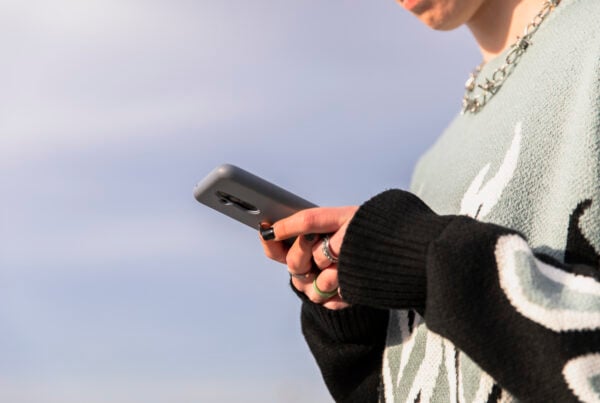Find out the week’s top mobile stories from around the world. This week… WhatsApp to let users message without their phones, Smart Toys and How they May be Invading our Privacy, PayPal’s Domination Of Mobile Payments Is Coming To An End and much more…

WhatsApp to let users message without their phones
BBC
WhatsApp is testing a new feature that will let people message without using their phone for the first time.
At present, WhatsApp is linked to a user’s phone. Its desktop and web apps need that device to be connected and receiving messages.
But the new feature will let users send and receive messages “even if your phone battery is dead”.
Read more…
Facebook Users Said No to Tracking. Now Advertisers are Panicking
Bloomberg
When users get asked on iPhone devices if they’d like to be tracked, the vast majority say no. That’s worrying Facebook Inc.’s advertisers, who are losing access to some of their most valuable targeting data and have already seen a decrease in effectiveness of their ads.
The new prompt from Apple Inc., which arrived in an iOS software update to iPhones in early June, explicitly asks users of each app whether they are willing to be tracked across their internet activity. Most are saying no, according to Branch, which analyzes mobile app growth. People are giving apps permission to track their behavior just 25% of the time, Branch found, severing a data pipeline that has powered the targeted advertising industry for years.
Read more…
Smart Toys and How they May be Invading our Privacy
National Law Review
While smart toys can be useful educational tools for children, they also present some potential privacy risks and could invade what is traditionally considered a private space. Think about it—the thought of your child’s toy listening in on your family 24/7/365 is disturbing. So how do we balance these risks with the benefits?
Smart toys that are made with artificial intelligence (AI) capabilities can collect different forms of data from children. For example, an AI-enabled toy may collect data to enable it to personalize lessons on how fast your child constructs a shape on the device or a doll may know your child’s favorite color or song so that it can “converse” with your child during playtime.
Read more…
PayPal’s Domination Of Mobile Payments Is Coming To An End
Forbes
In the world of mobile payments, PayPal is the Big Kahuna with more than 377 million users generating nearly $1 trillion in payment volume over 15.4 billion transactions in 2020. It’s dominance against competitors like Apple Pay, Google Pay, and Square Cash App is under attack, however.
It’s no surprise that the pandemic spurred the adoption of mobile payment apps. According to a study from Cornerstone Advisors conducted in December 2020, nearly eight in 10 smartphone owners have at least one mobile payment app on their smartphone, with the PayPal app installed on nearly two-thirds of all smartphones.
Apple’s new anti-tracking feature is costing advertisers a fortune
BGR
The iOS 14.5 update that Apple released in April is turning out to be a major headache for advertisers. Aside from introducing more emojis and new Siri voice options, iOS 14.5 saw the introduction of Apple’s App Tracking Transparency framework. The new framework is part of Apple’s ongoing push to strengthen iPhone privacy. The framework gives users more granular control over which apps are allowed to track their behavior across apps and websites.
iOS 14.5 still allows tracking for purposes of serving up ads, but users now have to opt-in. With that said, early reports indicate that upwards of 96% of iOS users are not opting in. As a result, advertisers know less information about users. In turn, advertisers can’t implement targeted ads to the extent they were able to before iOS 14.5 was released.
Read more…
‘Anonymous’ Mobile Advertising IDs Aren’t So Anonymous, And They Are Everywhere
Gizmodo
A new investigation from Motherboard shows that the anonymous marketing IDs assigned to smartphone users are not nearly as anonymous as they seem.
Most mobile operating systems are basically built to help serve you ads: whether you’re using Android or iOS, phone companies have historically assigned specific identifiers to devices, called (MAIDs), or mobile advertising IDs, that are supposed to help app developers better customize the commercials they shove in your face. (Apple’s situation has changed recently, more on that below.) In essence, they are meant to track a “customer journey and ‘remember’ his or her choices,” as one company so delightfully puts it, though the identity of the phone’s user is ostensibly supposed to remain invisible to advertisers.
Read more…
Seoul to implement city-wide public IoT network by 2023
Cities Today
Seoul’s public Internet of Things (IoT) network will be “in every corner of the city” by 2023, Seoul Metropolitan Government (SMG) said this week.
The 421 km long-range (LoRa) network will be established this year, with 1,000 base stations installed at public facilities such as community centres by 2023. SMG is also setting up an operations platform at city hall which will work as the central command centre to oversee data collection and distribution and the real-time management of the network.
Read more…
Mixed Signals from the Giants: Tiktok to Ban Crypto Ads, while Google Will Allow Them
Investing
Cryptocurrencies and digital assets have become mainstream over the last decade with many shooting up after receiving massive adoption. DeFi is now an accepted system and is being employed around the world, with over 4000 applications and coins now based on DeFi across several blockchains.
Fierce competition in the sector has led to developers seeking faster ways of achieving mass adoption in as short a time as possible, as relying on product utility alone won’t be enough to reach the desired goal.
New portable device from Steam will play your PC gaming library on a handheld
Washington Post
Valve, the company that manages PC gaming’s dominant storefront, Steam, announced its entry into the portable gaming market with the Steam Deck. The handheld gaming device will sell for between $399 and $649.
Reservations, which also come at a price, begin Friday for a planned December 2021 release in the U.S., Canada, Europe and United Kingdom. The form factor resembles the old Sega Game Gear portable from the 1990s, with two touch pads on either side of the screen to mimic use of a mouse.













